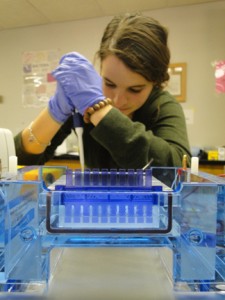Biology Major Overview For Prospective Majors
The Biology major is designed to provide a broad foundation for students considering a future in the life sciences, yet allows enough flexibility for students to follow their individual interests.

You can structure the major to follow your fascination with DNA replication, learn the in and outs of tree identification and physiology, study avian physiology, explore evolution, study plant and animal relationships with their environments and much more. Biology is also frequently a gateway to entering a health care profession or veterinary school.
Plan of Study – this is a synopsis of major requirements
(view full requirements).
Suggested courses to complete in first two years
We suggest that students complete the general and organic chemistry courses and the four course biology core sequence in their first two years. This allows maximum flexibility for electives or study abroad, and the widest choice in thesis research.
Off-campus study and study abroad (Advisor: Brett Huggett)
Many Biology majors enrich their Bates experience with off-campus study or study abroad. Plan study abroad carefully to insure completion of all requirements. For questions, or to make an appointment to discuss your study abroad plans, email Brett Huggett at: bhuggett-at-bates.edu.
How to become a Biology major
You may declare a major any time you feel you are ready, but you must declare a major by the winter semester of your sophomore year.
- Step-by-step instructions for declaring a major.
- Make an appointment with Ryan Bavis, Chair of Biology at rbavis@bates.edu.
Helicase – The Student Biology Club
Helicase is the student Biology club. Helicase sponsors several events throughout the year and is a good way to socialize and connect with fellow Biology majors and Biology Department faculty and staff.
Visiting Bates College and the Biology Department
The Biology Department offices and laboratories are located in Carnegie Science Hall and Bonney Science Center. The Biology faculty are pleased to meet with prospective students to discuss their interests and talk about our biology program. To make an appointment to meet with a Biology faculty member during your visit, contact:
Ryan W. Bavis
Pronouns:he/him/his
Helen A. Papaioanou Professor of Biological Sciences
Biology 207-786-8269Bonney Science Center, Room 287
Alexis F. Hockaday
Assistant Registrar
Office of the Registrar and Academic Systems
207-755-5919
Lane Hall, Room 110D
Outcomes and benefits of a being Bates Biology major
Recent surveys of Bates mathematics and science alumni over the past 20 years tell us that Bates graduates are extremely successful in pursuing advanced degrees in graduate or professional school. Nearly 76% of those responding to the survey reported that they had earned advanced degrees in their disciplines. An average of 40 Bates students or alumni enter schools across the health professions each year, and another 10 enter graduate schools in the sciences. Also, National Science Foundation data place Bates among the top 50 liberal arts colleges producing PhDs in STEM (science, technology, engineering, and mathematics) disciplines. More than 45% of Bates graduates who receive a Ph.D. do so in the sciences, powerful evidence of the strength of our undergraduate science program.